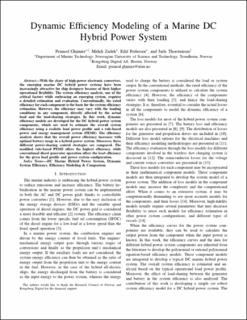| dc.contributor.author | Ghimire, Pramod | |
| dc.contributor.author | Zadeh, Mehdi | |
| dc.contributor.author | Pedersen, Eilif | |
| dc.contributor.author | Thorstensen, Jarle | |
| dc.date.accessioned | 2021-11-01T14:24:37Z | |
| dc.date.available | 2021-11-01T14:24:37Z | |
| dc.date.created | 2021-09-03T09:51:55Z | |
| dc.date.issued | 2021 | |
| dc.identifier.isbn | 978-1-7281-8949-9 | |
| dc.identifier.uri | https://hdl.handle.net/11250/2826993 | |
| dc.description.abstract | With the share of high-power electronic converters, the emerging marine DC hybrid power systems have been increasingly attractive for ship designers because of their higher operational flexibility. The system efficiency analysis, one of the critical factors while embracing an emerging system, requires a detailed estimation and evaluation. Conventionally, the rated efficiency for each component is the basis for the system efficiency estimation. However, the efficiency may vary with the loading conditions in any component, directly affected by the actual load and the load-sharing strategies. In this work, dynamic efficiency models are developed for the DC hybrid power system components, which are used to estimate the overall system efficiency using a realistic load power profile and a rule-based power and energy management system (PEMS). The efficiency analysis shows that the overall power efficiency increases with optimal battery usage in a hybrid power system. Moreover, three different power-sharing control strategies are compared. The modified rule-based PEMS offers the highest efficiency, while conventional diesel generator operation offers the least efficiency for the given load profile and power system configuration. | en_US |
| dc.language.iso | eng | en_US |
| dc.publisher | Institute of Electrical and Electronics Engineers (IEEE) | en_US |
| dc.relation.ispartof | 2021 IEEE Applied Power Electronics Conference and Exposition - APEC | |
| dc.subject | DC Power Systems | en_US |
| dc.subject | DC Power Systems | en_US |
| dc.subject | Energy Efficiency | en_US |
| dc.subject | Energy Efficiency | en_US |
| dc.subject | Energieffektivitet | en_US |
| dc.subject | Energy efficiency | en_US |
| dc.subject | Universitet-industri samarbeid | en_US |
| dc.subject | University industry co-operation | en_US |
| dc.subject | Matematisk modellering | en_US |
| dc.subject | Mathematical modelling | en_US |
| dc.subject | Maritime elektriske kraftsystemer | en_US |
| dc.subject | Marine Power System | en_US |
| dc.subject | Hybrid Electric Ships | en_US |
| dc.subject | Hybrid Electric Ships | en_US |
| dc.title | Dynamic Efficiency Modeling of a Marine DC Hybrid Power System | en_US |
| dc.type | Chapter | en_US |
| dc.description.version | acceptedVersion | en_US |
| dc.rights.holder | © IEEE. Personal use of this material is permitted. Permission from IEEE must be obtained for all other uses, in any current or future media, including reprinting/republishing this material for advertising or promotional purposes, creating new collective works, for resale or redistribution to servers or lists, or reuse of any copyrighted component of this work in other works. | en_US |
| dc.subject.nsi | VDP::Marin teknologi: 580 | en_US |
| dc.subject.nsi | VDP::Marine technology: 580 | en_US |
| dc.identifier.doi | 10.1109/APEC42165.2021.9487343 | |
| dc.identifier.cristin | 1931050 | |
| dc.relation.project | Norges forskningsråd: 290455 | en_US |
| cristin.ispublished | true | |
| cristin.fulltext | postprint | |
| cristin.qualitycode | 1 | |
